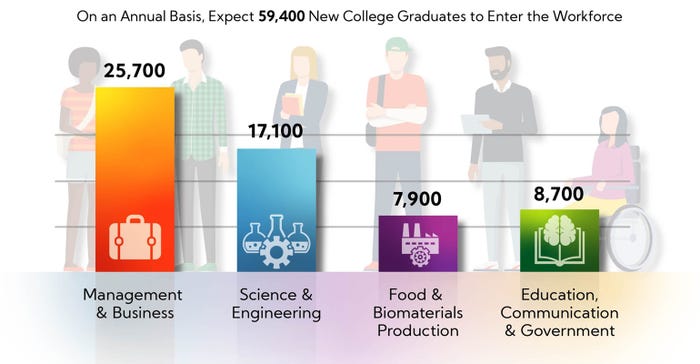February 24, 2021

During an interview with a large electrical company in St. Louis, Jacob Abel asked the head of engineering why he was chosen.
“He said he instructed his HR managers to pull any resume with an ag education experience and a FFA background,” said Abel, who graduated from the University of Missouri with a mechanical engineering degree. “He said those students in those organizations with that background have the work ethic and skills to come into his company and be an asset on day one.”
Students who take agriculture education and participate in FFA have an advantage in the job marketplace. Don’t believe me?
According to Parag Chitnis, acting director of USDA’s National Institute of Food and Agriculture, a recent report shows that students across America who are studying food, agriculture and related sciences made a “sound career choice and will graduate into a strong and growing job market in the years ahead.”
The USDA National Institute of Food and Agriculture and Purdue University report shows that over the next five years, U.S. college graduates can expect about 59,400 job opportunities annually in food, agriculture, renewable natural resources and the environment. Employer demand will actually exceed the supply of available graduates with a bachelor’s degree or higher in agriculture-related fields.
Ag demand areas
Most employment opportunities will be in business and management, think technical field specialists, financial managers and data scientists. The second-highest area is science and engineering. This career path includes plant breeding and genetics, food scientists, engineering and precision agriculture.
Openings in education, communication and government will make up 14% of jobs, and 13% will be in food and biomaterials production. But here’s the kicker: Nearly 92% of those jobs will go to food and agriculture science majors.
Overall, the report showed strong employment opportunities for specialists in marketing, e-commerce, food technology, and environmental and rural policy.
Soft skills
While our high school agricultural education programs offer the base knowledge to help students get a strong start on a college degree and ultimately a career path, FFA programs offer soft skills that often do not carry strong data. But they are what employers, like that St. Louis electric company, want.
For instance, FFA helps students understand collaboration in the workplace. FFA members learn to work as a group on a contest team. They understand how to listen to others, share their opinions and even take criticism. They have one goal — to win. To do that, they must work together in a respectful manner.
FFA teaches adaptability. Ask any student with a supervised agricultural experience how to make it successful, and they will likely tell you, “Be able to change.”

From students who raise crops and deal with weather and market fluctuations to those who raise livestock and deal with open cows or dead lambs, adapting is part of farming. FFA shows them not only how to adjust, but also how to do it with grace.
Perhaps the most important soft skill is passion. No matter what the job, FFA students tackle it with excitement. They are the ones who will go to work believing in what they do because they actually love their careers. FFA taught them that service to others, whether producing food or fixing equipment, is the hallmark of a good member of the community.
Why FFA?
Over my years, I’ve been asked, “Why are your kids in FFA?” My first response is “family tradition.” My husband and I were in FFA. However, that alone does not seem to spur others to join.
We need to share the data that shows FFA and agricultural education sets students up for career opportunities and success. We need to highlight those soft skills that FFA promotes. Ultimately, we need to be like Jacob and share our own job experiences — not only to non-farm students in our high schools, but also their parents as well. Perhaps we need to pass along this information to our public schools and its counselors.
If those raising the next generation can see the potential in the fields of food, agriculture and science and hear from former FFA members who can attest to employers searching for ag students, then perhaps the question will quickly change to “Why not FFA?”
If you would like to dig deeper into the report, here is a link.
You May Also Like




